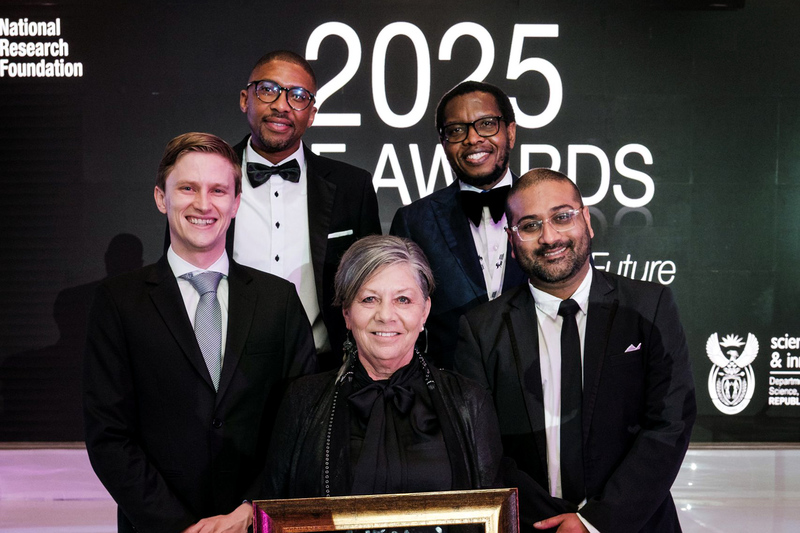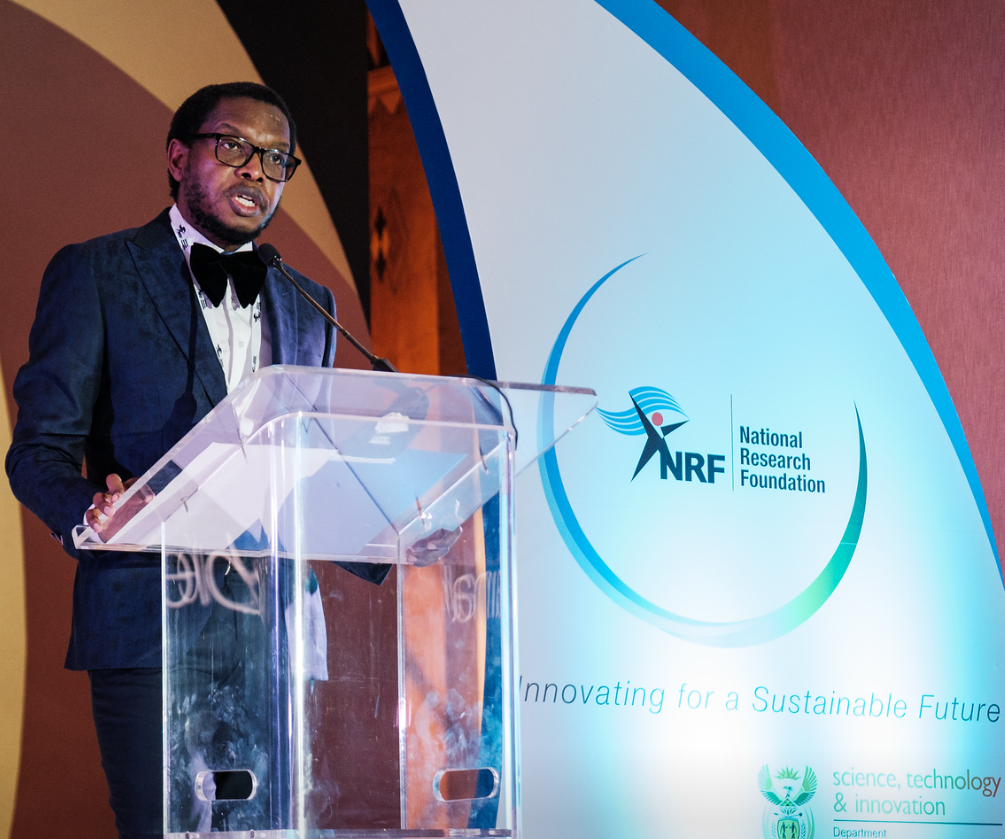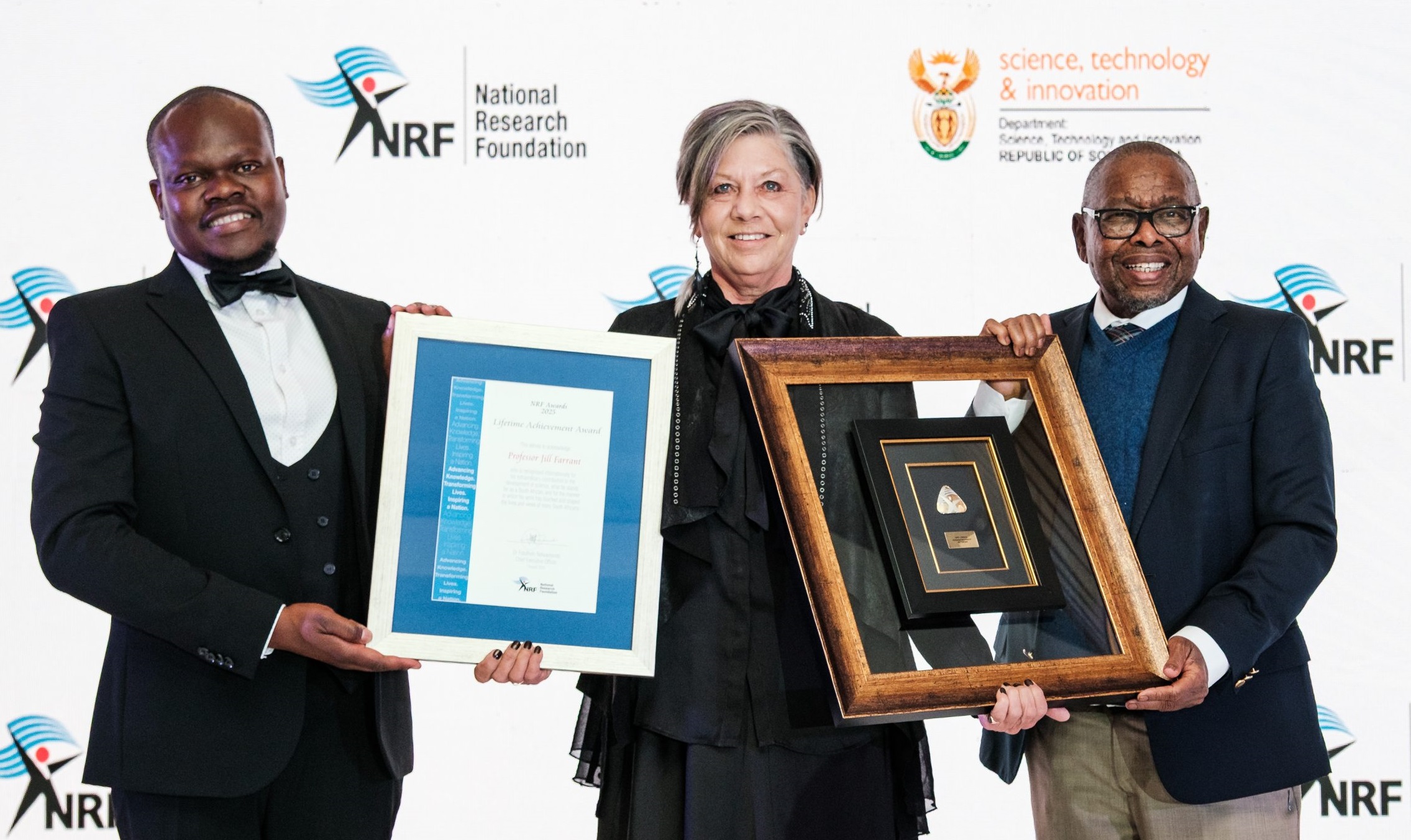UCT’s academic excellence celebrated at the NRF awards
13 August 2025 | Story Sarah Marriott. Photo Henry Marsh Photography. Read time 8 min.
The National Research Foundation (NRF) Awards are an annual celebration of the country’s top researchers, scientists and research teams, that acknowledge their efforts to advance knowledge and help society address and overcome challenges through research. Several leading University of Cape Town (UCT) researchers received recognition at the prestigious ceremony on 7 August 2025.
This year’s awards event was held under the theme Innovating for a Sustainable Future. Notably, this aligns with UCT’s Vision 2030, as underpinned by the three pillars of excellence, transformation and sustainability at the core of the University’s strategy. “This year’s awards are again a testament to the first-rate research conducted at UCT,” said Acting Deputy Vice-Chancellor for Research and Internationalisation, Professor Jeff Murugan. “Guided by our Vision 2030, our research portfolio challenges all of us at the university to build on our globally recognised expertise in the natural, health and social sciences, to produce research that answers the complex problems of today and tomorrow”.
UCT Vice-Chancellor, Professor Mosa Moshabela, in his role as Chairperson of the NRF Board, offered welcome remarks at the event that highlighted the awards as a recognition of both individual excellence and the collective power of science to transform society. “These awards recognise not only personal achievements, but also the role that science, technology and innovation play in shaping a more just, inclusive and sustainable future in this country, on the continent and in the world,” he said.

The achievements of the UCT awards winners exemplify the university’s commitment to driving scientific excellence. “Our scientific pursuits not only advance knowledge but also deeply impact societal change, sustainability and the lives of people in South Africa and beyond,” Prof Murugan said. “This is made possible through the hard work, innovation and dedication of UCT academics, researchers and the incredible support staff at the university.”
“This year’s awards are again a testament to the first-rate research conducted at UCT.”
The NRF awards are presented across two categories: Special Awards and the NRF Ratings-based Awards. UCT’s research strength and excellence were prominently displayed as two researchers and one postgraduate student received special recognition awards in the following categories:
Lifetime Achievement Award
This award recognises extraordinary contributions of international standard and impact to the development of science over an extended period of time.
Professor Jill Farrant, who holds the SARChI Chair in Plant Desiccation Tolerance and is based in UCT’s Department of Molecular and Cell Biology, is an internationally acclaimed plant molecular physiologist. As the world’s leading expert on resurrection plants, her work has positioned South Africa at the forefront of climate-adaptive agricultural science. Her transformative contribution to the field has far-reaching implications for global food security and climate resilience.

Prof Farrant has spent a lifetime of research aimed at improving drought tolerance in crops of African value. In so doing, she is contributing towards food security in a hotter, drier future. The implications of her research extend far beyond the continent however, informing global efforts to develop climate-resilient crops.
“I’m proud that my work is redefining our understanding of drought tolerance in plants,” she said. “It’s really important to contribute to international knowledge systems while simultaneously positioning South Africa as a hub for cutting-edge plant stress biology research.”
“It’s… important to contribute to international knowledge systems while simultaneously positioning South Africa as a hub for cutting-edge plant stress biology research.”
Over the course of her distinguished career, Farrant has combined scientific excellence with a deep commitment to leadership, capacity building, cross-border collaborations, mentorship and societal impact. Her work exemplifies the global relevance of South African science and innovation that the NRF Lifetime Achievement Award seeks to honour.
Research Excellence Award for Next Generation Researchers
This award recognises outstanding academic performance by final-year doctoral students.
Mr Jonathan Oehley, a PhD Candidate at UCT MedTech in the Department of Human Biology, is an emerging thought leader in the biomedical engineering field focused on addressing significant gaps in the scientific and experimental data regarding the safety and efficacy of in-human ultraviolet blood irradiation. His most prominent achievement—an original, patent-worthy device for fighting multidrug-resistant sepsis—demonstrates his aptitude for conceiving viable technological innovations.
Oehley’s research shows scientific maturity and practical relevance, using multidisciplinary collaborations to close crucial knowledge gaps through preclinical experimental research. In parallel with his academic research trajectory, he is developing a complementary path for research translation through HealthShot, the MedTech startup he is co-founding with Michael Awood, chief technology officer at UCT MedTech. This venture represents a practical application of his research group’s core philosophy of translating research into real-world impact.
"It is heartening to be recognised for my efforts in navigating the complex intersection between rigorous academic research and practical medical device innovation,” he said. “I am passionate about ensuring that novel medical technologies can progress beyond research prototypes. I believe translating biomedical innovations into industry is essential to impact the lives of the patients we design for.”
By effectively balancing open scientific dissemination with patent protection, Oehley exemplifies the next generation of South African researchers who fuse academic integrity with market-focused innovation.
Research Excellence Award for Early Career/Emerging Researchers
This award recognises outstanding research performance by current early career/emerging researchers.
Dr Itumeleng Monageng an astrophysicist currently holding a joint position as a Senior Lecturer in the Department of Astronomy at UCT and the South African Astronomical Observatory (NRF-SAAO). His work is critically important on both national and international levels, tackling some of the most intriguing questions in various subfields of astrophysical transients.
Dr Monageng conducts research on interacting binary stars, where he uses data from telescopes to understand the physical processes taking place in these systems. he has played a vital role in designing and coordinating observational campaigns using multiwavelength facilities such as SALT and MeerKAT.
Monageng’s research has advanced our understanding of energetic astronomical events, particularly advancing key areas of research in high-mass X-ray binaries through innovative data analysis techniques. By employing innovative observational strategies and sophisticated data analysis techniques, Monageng has enhanced our knowledge of complex physical mechanisms that were previously oversimplified.
He is also committed to student supervision and outreach, mentoring and supervising students and early-career researchers with exceptional dedication. “I’m proud of my contribution to capacity building and human capital development,” he said. “I believe it is really important to foster the development of the next generation of scientists and prioritise promoting diversity in astronomy by supervising students from underrepresented groups.”
NRF ratings-based awards
The Ratings-based awards are centred on a peer review system that looks at the research impact of the nominee over an eight-year period.
A-ratings are given to researchers who are unequivocally recognised by their peers as leading international scholars in their field. The quality and impact of their research are evaluated through the NRF’s peer-review rating system. This year, three UCT researchers obtained new A-ratings.
First ratings
- Professor Bruce Biccard
Department of Anaesthesia, Faculty of Health Sciences - Professor Sue Harrison
Faculty of Engineering & the Built Environment - Professor Harald Winkler
School of Economics, Faculty of Commerce
Second rating
- Professor Kelly Chibale
Faculty of Science
Third rating
- Professor Harold Kincaid
Faculty of Commerce - Professor Don Ross
Faculty of Commerce
Fourth rating
- Professor Dan Stein
Faculty of Health Sciences
Fifth rating
- Professor Igor Barashenkov
Department of Mathematics & Applied Maths, Faculty of Science - Professor Douglas Butterworth
Department of Mathematics & Applied Maths, Faculty of Science - Distinguished Professor Philippe-Joseph Salazar
Faculty of Law
P-ratings are assigned to researchers considered likely to become future international leaders in their respective fields based on their demonstration of exceptional potential. Usually under the age of 35, these are researchers who have held a doctorate of equivalent qualification for less than five years. Three UCT researchers obtained this rare and exceptional rating.
- Dr Mubeen Goolam
Department of Human Biology and the Neuroscience Institute, Faculty of Health Sciences - Dr Laura Heathfield
Biomedical Forensic Science Unit, Faculty of Health Sciences - Dr Jesse Heynick
Department of Computer Science, Faculty of Science
 This work is licensed under a Creative Commons Attribution-NoDerivatives 4.0 International License.
This work is licensed under a Creative Commons Attribution-NoDerivatives 4.0 International License.
Please view the republishing articles page for more information.










